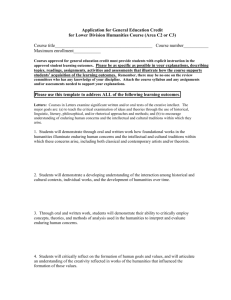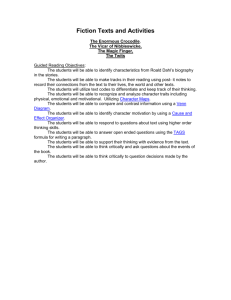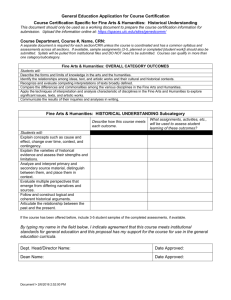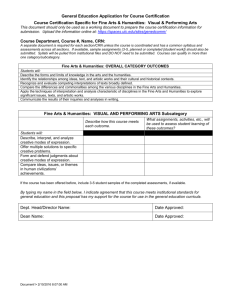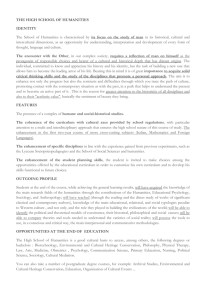Expanded Statement of Institutional Purpose
advertisement
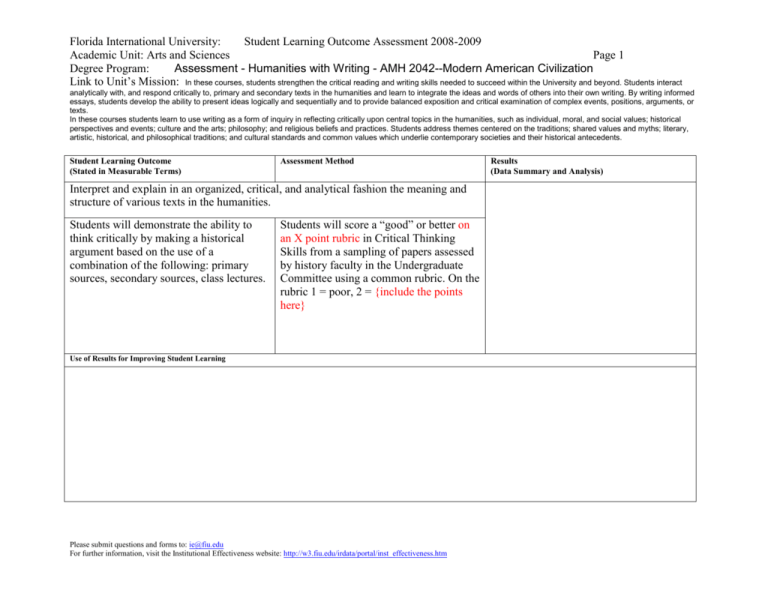
Florida International University:
Student Learning Outcome Assessment 2008-2009
Academic Unit: Arts and Sciences
Page 1
Degree Program:
Assessment - Humanities with Writing - AMH 2042--Modern American Civilization
Link to Unit’s Mission: In these courses, students strengthen the critical reading and writing skills needed to succeed within the University and beyond. Students interact
analytically with, and respond critically to, primary and secondary texts in the humanities and learn to integrate the ideas and words of others into their own writing. By writing informed
essays, students develop the ability to present ideas logically and sequentially and to provide balanced exposition and critical examination of complex events, positions, arguments, or
texts.
In these courses students learn to use writing as a form of inquiry in reflecting critically upon central topics in the humanities, such as individual, moral, and social values; historical
perspectives and events; culture and the arts; philosophy; and religious beliefs and practices. Students address themes centered on the traditions; shared values and myths; literary,
artistic, historical, and philosophical traditions; and cultural standards and common values which underlie contemporary societies and their historical antecedents.
Student Learning Outcome
(Stated in Measurable Terms)
Assessment Method
Interpret and explain in an organized, critical, and analytical fashion the meaning and
structure of various texts in the humanities.
Students will demonstrate the ability to
think critically by making a historical
argument based on the use of a
combination of the following: primary
sources, secondary sources, class lectures.
Students will score a “good” or better on
an X point rubric in Critical Thinking
Skills from a sampling of papers assessed
by history faculty in the Undergraduate
Committee using a common rubric. On the
rubric 1 = poor, 2 = {include the points
here}
Use of Results for Improving Student Learning
Please submit questions and forms to: ie@fiu.edu
For further information, visit the Institutional Effectiveness website: http://w3.fiu.edu/irdata/portal/inst_effectiveness.htm
Results
(Data Summary and Analysis)
Florida International University:
Student Learning Outcome Assessment 2008-2009
Academic Unit: Arts and Sciences
Page 2
Degree Program:
Assessment - Humanities with Writing - AMH 2042--Modern American Civilization
Link to Unit’s Mission: In these courses, students strengthen the critical reading and writing skills needed to succeed within the University and beyond. Students interact
analytically with, and respond critically to, primary and secondary texts in the humanities and learn to integrate the ideas and words of others into their own writing. By writing informed
essays, students develop the ability to present ideas logically and sequentially and to provide balanced exposition and critical examination of complex events, positions, arguments, or
texts.
In these courses students learn to use writing as a form of inquiry in reflecting critically upon central topics in the humanities, such as individual, moral, and social values; historical
perspectives and events; culture and the arts; philosophy; and religious beliefs and practices. Students address themes centered on the traditions; shared values and myths; literary,
artistic, historical, and philosophical traditions; and cultural standards and common values which underlie contemporary societies and their historical antecedents.
Student Learning Outcome
(Stated in Measurable Terms)
Assessment Method
Explain, interpret, evaluate, elaborate, and describe in an organized critical and analytical fashion the
context, history, influence, and structure of one or more of the following: Architectural, interior, and
landscape design, Religion and society, Philosophies/historical and contemporary, Cultures of the ancient
world, Major world civilizations, American history, Ibero-American history, Morality and life,
Contemporary Europe, History of Ideas, Intellectual History
Students will demonstrate the ability to
write a paper that has a clear thesis,
evidence organized into logical
paragraphs, and a conclusion
Students will score “good” or better on an
X point rubric in Written Communication
skills from a sampling of papers assessed
by history faculty in the Undergraduate
Committee using a common rubric. On the
rubric 1 = poor, 2 = {include the points
here}
Use of Results for Improving Student Learning
Please submit questions and forms to: ie@fiu.edu
For further information, visit the Institutional Effectiveness website: http://w3.fiu.edu/irdata/portal/inst_effectiveness.htm
Results
(Data Summary and Analysis)
Florida International University:
Student Learning Outcome Assessment 2008-2009
Academic Unit: Arts and Sciences
Page 3
Degree Program:
Assessment - Humanities with Writing - AMH 2042--Modern American Civilization
Link to Unit’s Mission: In these courses, students strengthen the critical reading and writing skills needed to succeed within the University and beyond. Students interact
analytically with, and respond critically to, primary and secondary texts in the humanities and learn to integrate the ideas and words of others into their own writing. By writing informed
essays, students develop the ability to present ideas logically and sequentially and to provide balanced exposition and critical examination of complex events, positions, arguments, or
texts.
In these courses students learn to use writing as a form of inquiry in reflecting critically upon central topics in the humanities, such as individual, moral, and social values; historical
perspectives and events; culture and the arts; philosophy; and religious beliefs and practices. Students address themes centered on the traditions; shared values and myths; literary,
artistic, historical, and philosophical traditions; and cultural standards and common values which underlie contemporary societies and their historical antecedents.
Student Learning Outcome
(Stated in Measurable Terms)
Assessment Method
Explain, interpret, evaluate, elaborate, and describe in an organized critical and analytical fashion the
context, history, influence, and structure of one or more of the following: Architectural, interior, and
landscape design, Religion and society, Philosophies/historical and contemporary, Cultures of the ancient
world, Major world civilizations, American history, Ibero-American history, Morality and life,
Contemporary Europe, History of Ideas, Intellectual History
Students will demonstrate an
understanding of the culture, events, and
ideas of past and present civilizations.
Students will score a “good” or better on
an X point rubric in Content and
Discipline Knowledge as measured by a
sampling of papers assessed by History
Faculty in the Undergraduate Committee
using a common rubric. On the rubric 1 =
poor, 2 = {include the points here}
Use of Results for Improving Student Learning
Please submit questions and forms to: ie@fiu.edu
For further information, visit the Institutional Effectiveness website: http://w3.fiu.edu/irdata/portal/inst_effectiveness.htm
Results
(Data Summary and Analysis)
Florida International University:
Student Learning Outcome Assessment 2008-2009
Academic Unit: Arts and Sciences
Page 4
Degree Program:
Assessment - Humanities with Writing - AMH 2042--Modern American Civilization
Link to Unit’s Mission: In these courses, students strengthen the critical reading and writing skills needed to succeed within the University and beyond. Students interact
analytically with, and respond critically to, primary and secondary texts in the humanities and learn to integrate the ideas and words of others into their own writing. By writing informed
essays, students develop the ability to present ideas logically and sequentially and to provide balanced exposition and critical examination of complex events, positions, arguments, or
texts.
In these courses students learn to use writing as a form of inquiry in reflecting critically upon central topics in the humanities, such as individual, moral, and social values; historical
perspectives and events; culture and the arts; philosophy; and religious beliefs and practices. Students address themes centered on the traditions; shared values and myths; literary,
artistic, historical, and philosophical traditions; and cultural standards and common values which underlie contemporary societies and their historical antecedents.
Summarize use of results for continuous improvement of learning:
Please submit questions and forms to: ie@fiu.edu
For further information, visit the Institutional Effectiveness website: http://w3.fiu.edu/irdata/portal/inst_effectiveness.htm
